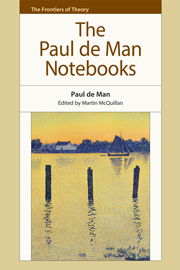Book contents
- Frontmatter
- Contents
- Series Editor's Preface
- Acknowledgements
- Dedication
- Introduction: ‘The Unimaginable Touch of Time’: The Public and Private in the Notebooks of Paul de Man
- PART I Texts
- PART II Translations
- PART III Teaching
- PART IV Research
- 27 The Unimaginable Touch of Time: Proposed Table of Contents
- 28 Modernism in Literature: Background and Essay Selection
- 29 Modernism in Literature: Revised Table of Contents
- 30 The Portable Rousseau: Table of Contents
- 31 The Portable Rousseau: Principle of Selection
- 32 Outline for a Monograph on Nietzsche
- 33 From Nietzsche to Rousseau
- 34 Allegories of Reading: Figural Language in Rousseau, Nietzsche, Rilke, and Proust
- 35 Aesthetics, Rhetoric, Ideology
- 36 11/3/82
- Appendix. The Notebooks of Paul de Man 1963–83
- Bibliography
- Index of Names
31 - The Portable Rousseau: Principle of Selection
from PART IV - Research
Published online by Cambridge University Press: 05 December 2014
- Frontmatter
- Contents
- Series Editor's Preface
- Acknowledgements
- Dedication
- Introduction: ‘The Unimaginable Touch of Time’: The Public and Private in the Notebooks of Paul de Man
- PART I Texts
- PART II Translations
- PART III Teaching
- PART IV Research
- 27 The Unimaginable Touch of Time: Proposed Table of Contents
- 28 Modernism in Literature: Background and Essay Selection
- 29 Modernism in Literature: Revised Table of Contents
- 30 The Portable Rousseau: Table of Contents
- 31 The Portable Rousseau: Principle of Selection
- 32 Outline for a Monograph on Nietzsche
- 33 From Nietzsche to Rousseau
- 34 Allegories of Reading: Figural Language in Rousseau, Nietzsche, Rilke, and Proust
- 35 Aesthetics, Rhetoric, Ideology
- 36 11/3/82
- Appendix. The Notebooks of Paul de Man 1963–83
- Bibliography
- Index of Names
Summary
The selection combines the theoretical side of Rousseau's thought, which is primarily of interest to students of political science and of intellectual history, with the more purely literary components of the works. It also provides the means to make connections between these two aspects of the work, by including such texts as the “Essay on the Origins of Language,” in which the link between Rousseau's reflections on language and his political theory becomes manifest. The book could therefore be used in courses in European civilization, in political theory, in the history of the Enlightenment, in the European novel, in romanticism or even in linguistics. The inclusion of the two main theoretical texts in unabridged form (The Second Discourse on The Origins of Inequality and The Social Contract) weighs the contents in the direction of political theory, but the literature-oriented interpretation, in the introduction, notes and explanatory comments, restores the balance. The inclusion of shorted and lesser-known literary texts serves the same purpose, since the two main literary texts (Julie and The Confessions) are too lengthy to be included in toto. The integrity of the texts is maintained as faithfully as possible, by respecting the author's own internal divisions. For instance, the extracts from the epistolary novel Julie are always the complete units of the individual letters, given in their entirety. The excerpts have to be fragments but, whenever possible, the fragments are complete in themselves.
- Type
- Chapter
- Information
- The Paul de Man Notebooks , pp. 297Publisher: Edinburgh University PressPrint publication year: 2014



